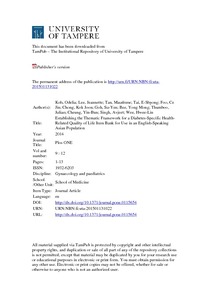Establishing the Thematic Framework for a Diabetes-Specific Health-Related Quality of Life Item Bank for Use in an English-Speaking Asian Population
Koh, Odelia; Lee, Jeannette; Tan, Maudrene; Tai, E-Shyong; Foo, Ce Jin; Chong, Kok Joon; Goh, Su-Yen; Bee, Yong Mong; Thumboo, Julian; Cheung, Yin Bun; Singh, Avjeet; Wee, Hwee-Lin (2014)
Koh, Odelia
Lee, Jeannette
Tan, Maudrene
Tai, E-Shyong
Foo, Ce Jin
Chong, Kok Joon
Goh, Su-Yen
Bee, Yong Mong
Thumboo, Julian
Cheung, Yin Bun
Singh, Avjeet
Wee, Hwee-Lin
2014
Plos ONE 9 12
1-13
Lääketieteen yksikkö - School of Medicine
This publication is copyrighted. You may download, display and print it for Your own personal use. Commercial use is prohibited.
Julkaisun pysyvä osoite on
https://urn.fi/URN:NBN:fi:uta-201501131022
https://urn.fi/URN:NBN:fi:uta-201501131022
Kuvaus
Public Library of Science open access
Tiivistelmä
Aims
To establish a thematic framework for a Diabetes Mellitus (DM)-specific health-related quality of life (HRQoL) item bank by identifying important HRQoL themes and content gaps in existing DM-specific HRQoL measures and determining whether Patient-Reported Outcomes Measurement Information System (PROMIS) item banks are useful as a starting point.
Methodology
English-speaking Type 2 DM patients were recruited from an outpatient specialist clinic in Singapore. Thematic analysis was performed through open coding and axial coding. Items from four existing DM-specific measures and PROMIS Version 1.0 and 2.0 item banks were compared with identified themes and sub-themes.
Results
42 patients participated (25 men and 17 women; 28 Chinese, 4 Malay, 8 Indians, 2 other ethnicities). Median age was 53.70 years (IQR45.82–56.97) and the median disease duration was 11.13 (SD9.77) years. 10 subthemes (neutral emotions, coping emotions, empowered to help others, support from family, spend more time with family, relationships, financial burden on family, improved relationship, social support and religion/spirituality) were not covered by existing DM-specific measures. PROMIS covered 5 of 6 themes, 15 of 30 subthemes and 19 of 35 codes identified. Emotional distress (frustration, fear and anxiety) was most frequently mentioned (200 times).
Conclusions
We had developed a thematic framework for assessing DM-specific HRQoL in a multi-ethnic Asian population, identified new items that needed to be written and confirmed that PROMIS was a useful starting point. We hope that better understanding and measurement of HRQoL of Asian DM patients will translate to better quality of care for them.
To establish a thematic framework for a Diabetes Mellitus (DM)-specific health-related quality of life (HRQoL) item bank by identifying important HRQoL themes and content gaps in existing DM-specific HRQoL measures and determining whether Patient-Reported Outcomes Measurement Information System (PROMIS) item banks are useful as a starting point.
Methodology
English-speaking Type 2 DM patients were recruited from an outpatient specialist clinic in Singapore. Thematic analysis was performed through open coding and axial coding. Items from four existing DM-specific measures and PROMIS Version 1.0 and 2.0 item banks were compared with identified themes and sub-themes.
Results
42 patients participated (25 men and 17 women; 28 Chinese, 4 Malay, 8 Indians, 2 other ethnicities). Median age was 53.70 years (IQR45.82–56.97) and the median disease duration was 11.13 (SD9.77) years. 10 subthemes (neutral emotions, coping emotions, empowered to help others, support from family, spend more time with family, relationships, financial burden on family, improved relationship, social support and religion/spirituality) were not covered by existing DM-specific measures. PROMIS covered 5 of 6 themes, 15 of 30 subthemes and 19 of 35 codes identified. Emotional distress (frustration, fear and anxiety) was most frequently mentioned (200 times).
Conclusions
We had developed a thematic framework for assessing DM-specific HRQoL in a multi-ethnic Asian population, identified new items that needed to be written and confirmed that PROMIS was a useful starting point. We hope that better understanding and measurement of HRQoL of Asian DM patients will translate to better quality of care for them.
Kokoelmat
- Artikkelit [6140]
